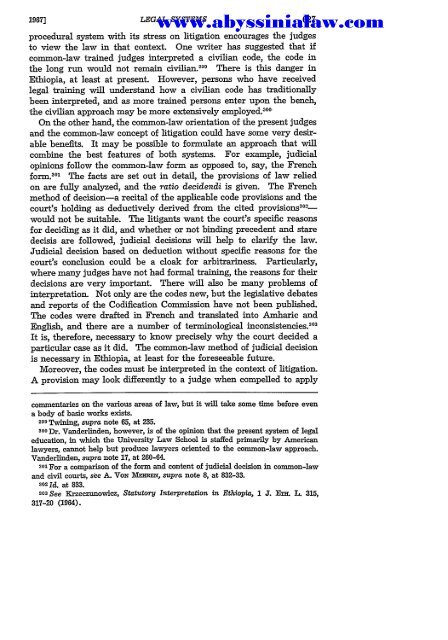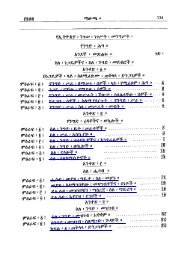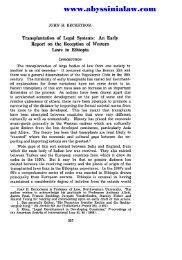You also want an ePaper? Increase the reach of your titles
YUMPU automatically turns print PDFs into web optimized ePapers that Google loves.
19671 LEGAL SYSTEMS<br />
procedural system with its stress on litigation encourages the judges<br />
to view the law in that context. One writer has suggested that if<br />
common-law trained judges interpreted a civilian code, the code in<br />
the long run would not remain civilian. 299 There is this danger in<br />
Ethiopia, at least at present. However, persons who have received<br />
legal training will understand how a civilian code has traditionally<br />
been interpreted, and as more trained persons enter upon the bench,<br />
the civilian approach may be more extensively employed3 00 On the other hand, the common-law orientation of the present judges<br />
and the common-law concept of litigation could have some very desirable<br />
benefits. It may be possible to formulate an approach that will<br />
combine the best features of both systems. For example, judicial<br />
opinions follow the common-law form as opposed to, say, the French<br />
form. 9 01 The facts are set out in detail, the provisions of law relied<br />
on are fully analyzed, and the ratio decidendi is given. The French<br />
method of decision-a recital of the applicable code provisions and the<br />
court's holding as deductively derived from the cited provisions<br />
would not be suitable. The litigants want the court's specific reasons<br />
for deciding as it did, and whether or not binding precedent and stare<br />
decisis are followed, judicial decisions will help to clarify the law.<br />
Judicial decision based on deduction without specific reasons for the<br />
court's conclusion could be a cloak for arbitrariness. Particularly,<br />
where many judges have not had formal training, the reasons for their<br />
decisions are very important. There will also be many problems of<br />
interpretation. Not only are the codes new, but the legislative debates<br />
and reports of the Codification Commission have not been published.<br />
The codes were drafted in French and translated into Amharic and<br />
English, and there are a number of terminological inconsistencies.<br />
3 --<br />
It is, therefore, necessary to know precisely why the court decided a<br />
particular case as it did. The common-law method of judicial decision<br />
is necessary in Ethiopia, at least for the foreseeable future.<br />
Moreover, the codes must be interpreted in the context of litigation.<br />
A provision may look differently to a judge when compelled to apply<br />
commentaries on the various areas of law, but it will take some time before even<br />
a body of basic works exists.<br />
2 99 Twining, supra note 65, at 235.<br />
300 Dr. Vanderlinden, however, is of the opinion that the present system of legal<br />
education, in which the University <strong>Law</strong> School is staffed primarily by American<br />
lawyers, cannot help but produce lawyers oriented to the common-law approach.<br />
Vanderlinden, supra note 17, at 260-64.<br />
301 For a comparison of the form and content of judicial decision in common-law<br />
and civil courts, see A. VoN lmHE, supra note 8, at 832-33.<br />
302 Id. at 833.<br />
$03 See Krzeczunowicz, Statutory Interpretation in Ethiopia, 1 J. ETmx L. 315,<br />
317-20 (1964).<br />
www.abyssinialaw.com<br />
0 3





